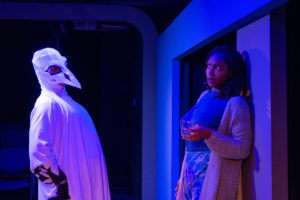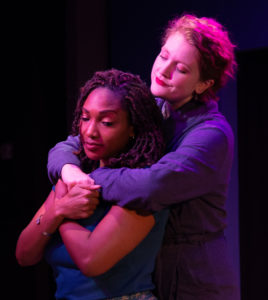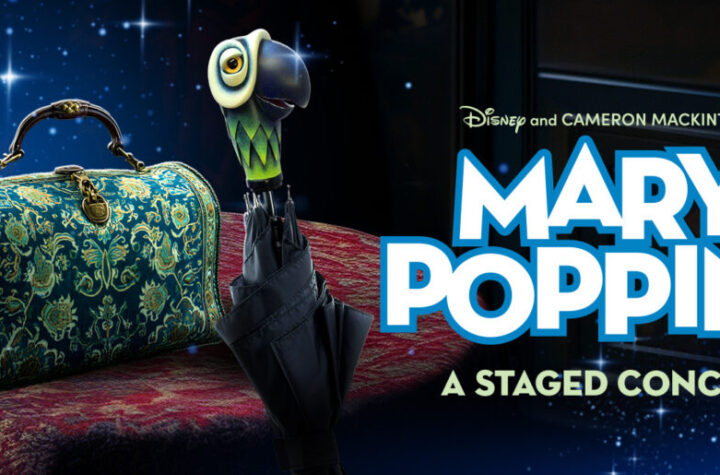
 [rating=2]“Babel”, written by Jacqueline Goldfinger and directed by Rinska Carrasco-Prestinary is a “Brave New World” type of story about what could happen in a futuristic alternate universe where the government becomes actively involved in the makeup of families and their procreation. In the case of this engineered society called Babel, the social order requires that parents give birth to the perfect child, who is thought to be the root of the perfect society. Doctors not only verify the physical and mental health of all babies in utero, but they also screen for likely violent tendencies and social non-conformity. So if an otherwise normal child is thought to become a sociopath at a later date, the fetus does not receive a “precertification” from a doctor, and an abortion is recommended. However, if the parent refuses to abort it, then the child is destined for a fate that places them into a permanent underclass, exiled from everybody else. The wayward parents might be shunned by their peers and unable to remain in their choice social positions; they might also be on the receiving end of law enforcement. The underlying question is how and why do citizens reach the point of enacting and following such draconian laws?
[rating=2]“Babel”, written by Jacqueline Goldfinger and directed by Rinska Carrasco-Prestinary is a “Brave New World” type of story about what could happen in a futuristic alternate universe where the government becomes actively involved in the makeup of families and their procreation. In the case of this engineered society called Babel, the social order requires that parents give birth to the perfect child, who is thought to be the root of the perfect society. Doctors not only verify the physical and mental health of all babies in utero, but they also screen for likely violent tendencies and social non-conformity. So if an otherwise normal child is thought to become a sociopath at a later date, the fetus does not receive a “precertification” from a doctor, and an abortion is recommended. However, if the parent refuses to abort it, then the child is destined for a fate that places them into a permanent underclass, exiled from everybody else. The wayward parents might be shunned by their peers and unable to remain in their choice social positions; they might also be on the receiving end of law enforcement. The underlying question is how and why do citizens reach the point of enacting and following such draconian laws?
This dystopian drama is personalized by following two couples who are both pregnant and friends with each other. The lesbian couple consists of the mother-to-be Renee (Monique Marshaun) and her spouse Dani (Shannon Leigh Webber), while the straight couple is made up of Jamie (Michael Sherwin) and Ann (Soleil Pérez). Renee and Dani’s baby appears to have failed some type of prenatal/precertification examination, where the doctor feels that it is in the best interest of society that this particular fetus be aborted and the couple should try again. However, both Renee and Dani want this baby badly, in large part because it was so hard for Renee to get pregnant. They believe that as a couple they did everything right: having to do with the mixing of their eggs and getting an approved sperm donor—so their baby is bound to be perfect! In contrast, Ann gets pregnant naturally and easily; and for that reason, she and Jamie are confident that everything is perfect too with their pregnancy and their unborn child.
The script is five parts gravity to one part levity. The tragedy of this show has to do with what can happen in a society when the desire for safety and security becomes confused with social conformity. This is compounded by the unsubstantiated belief that any one person’s entire future can be determined before birth. Hence, the play paints a grim portrait of a prospective world where everyone has to blindly obey government dictates, and ultimately they have no true freedom; this is not just in the area of reproduction but in all areas of their lives. Then there are the more lighthearted moments in the performance that mostly have to do with Renee’s apparent dreams where a life-sized stork plays castanets. He is rude and crude and jumps around and frolics. This part of the tale adds some needed comic relief but is incredibly far-fetched.
The set design by Jonathan Berg-Einhorn is relatively simple but very interesting and versatile. The curvature of the floor and on portions of the walls is quite different and pleasing. I especially liked the painted wooden floor and wooden walls, due to the work of Rose Johnson—as well as how the lights were hung to emphasize the unusually shaped stage. Lighting designer Cat Davis has done beautiful work in shifting the lighting: sometimes to represent water; sometimes to represent blood; sometimes to represent tears. Costume designer Kathleen Gardin has done a fine job, especially with the amusing stork outfit and over-the-top mask. Jake Sorgen’s sound design and Jeff Brain’s property design are both right on the mark.
In all, the play takes on an extremely weighty and timely subject about the meaning of reproductive rights, parentage, and civil rights in general. The extreme social experiment taking place in the fictional Babel may have initially seemed like a good idea but has turned out to be disastrous for its citizens. We see what can happen when personal privacy is not respected and when boundaries between people are being constantly invaded. The problem, however, with this play is that too many of its component parts don’t gel. Certain aspects of the story seem confusing, inconsistent, underdeveloped, or just plain bizarre, especially regarding how the two couples are connected to each other. Nevertheless, I do not fault the playwright and the theatre company for their valiant attempt to show what dangers may lurk when individuals are forced by a cruel and unyielding State to do things against their will and against their own best interest. Considering all the rationalizations and explanations that went into setting up this dystopia, I wanted to like the play more than I did.
“Babel” is playing through April 30, 2023, at Redtwist Theatre, 1044 W. Bryn Mawr Avenue, in Chicago’s Edgewater neighborhood.
The running time is 95 minutes with no intermission.
 Performances are as follows:
Performances are as follows:
Thursdays, Fridays, and Saturdays – 7:30 p.m.
Sundays – 3:30 p.m.
General admission tickets are $40.
For more information or to purchase tickets, go to https://www.redtwisttheatre.org/
Student, military and senior discounts are available at https://www.redtwisttheatre.org/ or by emailing reserve@redtwist.org.
COVID requirements dictate that everybody entering the building and seated in the theater must wear a mask. There is no need to produce a vaccination card at this time. Protocols are subject to change at any time.
To see what others are saying, visit www.theatreinchicago.com, go to Review Round-Up and click at “Babel”.






More Stories
“The Joffrey Ballet’s Golden Hour” reviewed by Carol Moore
“Mary Poppins : A Staged Concert” reviewed by Julia W. Rath
” I and You”